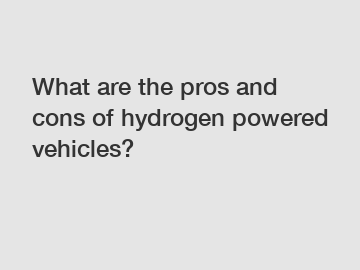What are the pros and cons of hydrogen powered vehicles?
Hydrogen-powered vehicles, also known as fuel cell vehicles, have gained popularity in recent years as a promising alternative to traditional gasoline-powered vehicles. These vehicles use hydrogen gas to generate electricity through a chemical reaction, producing water vapor as the only emission. While hydrogen fuel cell technology offers numerous benefits, it also comes with its own set of challenges and limitations. In this article, we will explore the pros and cons of hydrogen-powered vehicles.
H2: Pros of Hydrogen-Powered Vehicles.
1. Environmental Benefits.

One of the main advantages of hydrogen-powered vehicles is their minimal impact on the environment. Unlike gasoline-powered vehicles, hydrogen fuel cell vehicles emit only water vapor and heat, making them a cleaner alternative in terms of air pollution and greenhouse gas emissions. As the world shifts towards sustainable transportation solutions, hydrogen-powered vehicles play a crucial role in reducing carbon emissions and combating climate change.
2. Energy Efficiency.
Hydrogen fuel cells are more energy-efficient than internal combustion engines, as they convert chemical energy directly into electricity. This results in higher efficiency rates and better fuel economy, making hydrogen-powered vehicles a viable option for reducing overall energy consumption in the transportation sector. Additionally, hydrogen fueling stations can be powered by renewable energy sources, further enhancing the sustainability of this technology.
3. Fast Refueling and Longer Range.
One of the key advantages of hydrogen-powered vehicles is their fast refueling time compared to electric vehicles. While electric vehicles require hours to recharge their batteries, hydrogen fuel cell vehicles can be refueled in a matter of minutes, similar to traditional gasoline vehicles. This quick refueling capability, combined with a longer driving range, makes hydrogen-powered vehicles a practical choice for long-distance travel and commercial applications.
H2: Cons of Hydrogen-Powered Vehicles.
1. Limited Infrastructure.
One of the biggest challenges facing hydrogen-powered vehicles is the lack of infrastructure for hydrogen refueling stations. Currently, there are only a limited number of hydrogen fueling stations available, mainly in urban areas and select regions. This infrastructure gap hinders the widespread adoption of hydrogen-powered vehicles and limits their practicality for everyday use, especially in rural areas or areas without adequate infrastructure.
2. High Costs.
Another major downside of hydrogen-powered vehicles is their high upfront costs. The production and storage of hydrogen gas, as well as the manufacturing of fuel cell technology, are currently more expensive than traditional gasoline-powered vehicles or electric vehicles. While technological advancements and economies of scale are expected to reduce costs in the future, the initial investment required for hydrogen-powered vehicles remains a barrier for many consumers.
3. Limited Fuel Availability.
Unlike gasoline or electricity, hydrogen fuel is not widely available for purchase, which can pose challenges for hydrogen-powered vehicle owners. Additionally, the transportation and distribution of hydrogen gas require specialized infrastructure, further complicating the supply chain for hydrogen fuel. As a result, the availability of hydrogen fuel is limited to certain regions and may vary depending on local regulations and market conditions.
In conclusion, hydrogen-powered vehicles offer a range of environmental and energy efficiency benefits, but they also face challenges related to infrastructure, costs, and fuel availability. As technology continues to evolve and infrastructure improves, hydrogen fuel cell vehicles have the potential to become a mainstream transportation option in the future. However, addressing these challenges will require collaboration between industry stakeholders, policymakers, and consumers to realize the full potential of hydrogen-powered vehicles.
Contact us to learn more about hydrogen-powered vehicles and sustainable transportation solutions.
Are you interested in learning more about LNG Storage solution, insustrial gas tank container, LNG Semi-trailer? Contact us today to secure an expert consultation!


